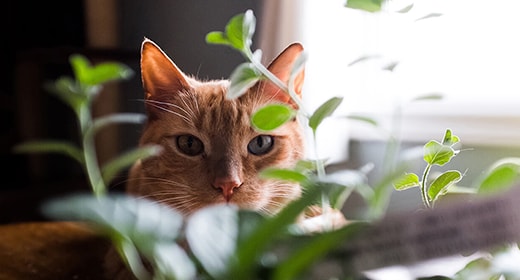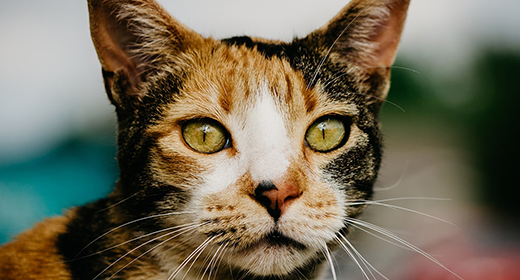

Humans aren’t the only ones affected by allergies. Like you, your adult cat can suffer from allergic reactions to any number of things in the air, on her skin and in her food. Allergies must be diagnosed and treated by a veterinarian, but first you must know what to look for.
Four of the most common types of allergies that might affect your cat are inhalant, food, contact and flea allergies.
Inhalant allergies in cats are caused by the same common allergens that affect you: dust, grass, trees, mold, pollen, ragweed and so on. They can be seasonal or persistent, and while some breeds may experience the same sniffly, sneezy symptoms humans often suffer, skin reactions are most common. Inhalant allergies can often be treated with the same medications you take, but please don’t treat your cat’s allergies without veterinary supervision.
Food allergies in cats can be the most difficult to diagnose and manage. Treatment involves a hit-or-miss approach involving a restricted diet and the gradual reintroduction of possible allergens to determine the culprit. Skin reactions to food allergies are common in cats, but frequent vomiting or diarrhea also can be a sign. Keep in mind that if your cat’s diet changes (or she just ate something she wasn’t supposed to), she may experience an episode of vomiting or diarrhea. This doesn’t necessarily mean your cat has an allergy. Watch and see if it becomes a persistent problem before scheduling a trip to the vet.
You might be surprised to learn that most cats are only vaguely bothered by fleas. But those that are allergic can suffer — and so can their owners. Contact and flea allergies generally cause skin irritation in cats and are treated topically. Cats with contact and flea allergies often chew their skin raw, leading to hair loss, odor and infection, so fastidious flea control is a must.
The most common allergy symptoms in cats are skin reactions, regardless of the cause, and they can appear at any age. Just because your cat didn’t have allergies as a kitten doesn’t mean she won’t have them as an adult. If your cat suffers from any of the following symptoms, take her to the vet for a consultation:
Allergies can vary from cat to cat, so it is important that you work with your vet to make sure your cat gets the best possible treatment. You’ll both be happier as a result.


Taurine is an important component to all IAMS™ cat foods, such as IAMS ProActive Health™ Adult Original with Chicken.
Taurine is an essential amino acid that is critical for normal heart muscle function, vision, and reproduction in kittens. It is also needed to form the bile salts that aid in digestion. Unlike other amino acids, taurine is found as a free amino acid in body tissues such as the heart and eyes, and is not incorporated into proteins.
Most mammals manufacture taurine from other amino acids. However, cats cannot manufacture a sufficient amount and, therefore, must acquire enough additional taurine through diet to meet their needs. In pet food, taurine is naturally found in animal-based protein ingredients and can also be added separately.
Taurine is supplemented in IAMS dry and canned cat foods to ensure that we provide optimal levels of this essential nutrient. IAMS wet cat foods are supplemented with taurine because they must contain as much as twice the amount of taurine found in dry food for cats to maintain adequate blood taurine levels. The canning process may affect the complex taurine balance in your cat. Our wet cat foods are supplemented with taurine to meet these higher needs.
IAMS dry cat foods also include taurine as an ingredient to supplement the primary source of this amino acid, which is animal-based protein from sources such as chicken, egg, lamb, and fish. However, these sources can vary in their taurine content, and adding more taurine is a sound approach to ensure optimal taurine levels.
Taurine is essential to the proper development and function of cells in the retina of the eye. If insufficient taurine is present, the retinal cells don’t function properly and may die, eventually causing impaired vision and even blindness. This process is referred to as feline central retinal degeneration.
Taurine is also necessary for normal function of the heart muscle cells. Taurine deficiency leads to weakening of the heart muscle, which, in turn, can lead to heart failure. This condition is known as dilated cardiomyopathy and can be fatal.
Decreased Reproductive Performance and Growth
Taurine is necessary for optimal reproductive and growth performance. Both the queen and kittens must maintain adequate taurine levels during pregnancy, lactation, and growth to ensure proper structural development.
IAMS cat foods are formulated with high-quality, animal-based proteins as their primary ingredient. In addition, they are supplemented with extra taurine to ensure balanced levels of essential amino acids.
Case L, et al. Canine and Feline Nutrition. 3rd ed. Maryland Heights, MO: Mosby Elsevier, 2011.